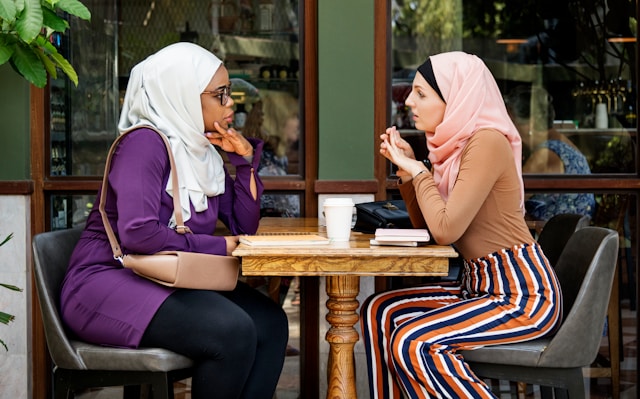Fake people don’t usually announce their lack of authenticity or make it obvious—at least not at first.

Most of the time, they enter your life sounding incredibly sweet, overly supportive, and just believable enough. They say all the right things, for sure, but their timing, tone, and follow-through don’t quite add up. It’s not always full-on lies that expose them, either. It’s usually the sugarcoated phrases they use to flatter, distract, and subtly get what they want. Here are the common lines they use to charm their way in, and twist things when it suits them.
1. “You’re the only person I can really talk to.”

Sounds like deep trust, right? However, when this line comes too soon or is repeated too often, it’s less about connection and more about making you feel special enough to drop your guard. It creates a false sense of closeness so they can access your time, energy, or information. Meanwhile, they’re likely saying the same thing to other people behind your back.
2. “No one else gets you like I do.”

This one feels flattering—until you realise it’s actually about isolating you. The idea is to subtly distance you from other people, making you believe your other relationships aren’t as valuable or real. It builds emotional dependence so they stay at the centre of your world. Real connection doesn’t require tearing down your bonds with other people to prove its strength.
3. “You’re so much better than them.”

This seems like a compliment, but it’s often said to stir drama, jealousy, or competition. It positions you above someone else and encourages comparison, even if you didn’t ask for it. It’s a manipulation tactic wrapped in praise. Instead of lifting you up, it’s designed to push other people down and pull you closer to them—for now.
4. “I’ve never met anyone like you.”

Early on, this can feel romantic or deeply validating. However, when it’s thrown around casually or too frequently, it starts to feel less like admiration and more like a tactic. It’s a way to fast-track trust and deepen emotional ties before anything’s actually been earned. Watch for whether their actions match all that praise, or if it disappears once they’ve got what they wanted.
5. “You’re the only one I trust with this.”

They’re not sharing because they trust you. They’re sharing because they want you to trust them back. It’s often used to create a bond that feels meaningful, even if it’s built on half-truths. Oversharing in that way early on is strategic. It’s not real vulnerability—it’s bait. Once you’re in, they might use what you’ve shared as leverage later.
6. “People are just jealous of you.”

If someone’s hurt you, disagreed with you, or called you out, the fake friend swoops in with this line. It sounds supportive, but it’s designed to keep you from reflecting or growing. It dismisses all criticism as envy, and keeps you feeling misunderstood, while they position themselves as the only one who really sees your worth. It flatters your ego while feeding their control.
7. “You’re way too good for them.”

This gets used in relationships, friendships, even work dynamics. It’s meant to sound empowering, but when said repeatedly, it often pushes you to cut ties that are perfectly healthy—just not useful to them. It’s a subtle way of shaping your choices without being obvious. They act like they’re supporting you, when they’re really steering you toward isolation or dependence.
8. “I’d never do that to you.”

This one shows up right after you’ve been wronged or are feeling vulnerable. It sounds comforting, but in toxic hands, it’s really just setting up false loyalty. People with real integrity don’t need to say this—they show it. When someone keeps needing to remind you that they’d never hurt you, ask yourself why they’re working so hard to convince you.
9. “You’re the only person I can count on.”

This one loads you with responsibility under the guise of flattery. It can make you feel important and needed—but it’s often used to guilt you into doing more than you should. Suddenly, you’re carrying their emotional baggage, doing their work, or bending over backwards—because “you’re the only one.” Healthy people don’t turn your kindness into a burden.
10. “You’ve changed, and not in a good way.”

This usually gets pulled out when you start setting boundaries or pulling away from their influence. It’s presented as concern, but really, it’s a way to shame you back into who they preferred you to be. It’s the manipulation version of missing the “old you.” However, the old you was easier to control, and that’s what they’re really mourning.
11. “I just want what’s best for you.”

Used genuinely, it’s a lovely sentiment. But in fake hands, it’s code for “I want you to do what I think is best for you.” It sounds selfless, but it’s really a disguise for control. If their idea of what’s best never includes your input, desires, or agency, it’s not support—it’s puppeteering. Real care includes collaboration, not quiet manipulation.
12. “I would never lie to you.”

The more someone insists on their honesty without being asked, the more you need to pay attention. Trustworthy people don’t need to declare it all the time—they let their actions prove it. This one is often used to deflect suspicion or push through half-truths. If someone’s saying this too often, it’s worth watching how they behave when the spotlight’s off.
13. “I wish more people were like you.”

At first, this sounds like the highest praise, but in certain situations, it’s just another way to play favourites—often right before they compare you to someone they’re trying to discredit. This tactic makes you feel special, but it usually comes at someone else’s expense. And it keeps you hooked on their approval, waiting for the next compliment to prove you’re still the favourite.
14. “Don’t overthink it—I’d never hurt you.”

They say this when your instincts start picking up on red flags. It’s a gentle shutdown designed to make you doubt yourself instead of asking more questions. It pushes your intuition to the side so they can keep things comfortable for themselves. Real friends don’t silence your gut—they encourage you to trust it.
15. “You’re the best thing that’s ever happened to me.”

This one’s powerful, especially in romantic settings. Of course, when it’s said early, often, or during a fight, it’s not affection. It’s a tactic. A way to keep you emotionally anchored when you’re starting to drift. If someone keeps using this phrase during moments when you’re pulling away, it’s not about love. It’s about control dressed as devotion. Real love doesn’t just say it—it shows it, without the theatrics.




